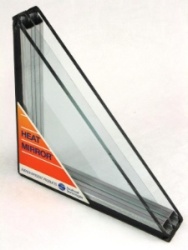Mar 5 2010
Southwall Technologies Inc. (OTCBB:SWTX), the worldwide innovator of energy-saving films and glass products, announced today that its Heat Mirror® film technology was selected to dramatically boost the energy-efficiency of the more than 6,500 hundred windows being upgraded as part of the Empire State Building energy retrofit project. The announcement marks another milestone along Southwall’s path of industry firsts, including the world’s first low-e insulating glass product and the world’s first multi-cavity “super glass” to achieve up to R-20 insulating performance comparable to that of a wall.
 Heat Mirror insulating glass uses Southwall's Heat Mirror suspended film technology to create multiple, super-insulating cavities that provide superior energy efficiency for today's demanding green building projects.
Heat Mirror insulating glass uses Southwall's Heat Mirror suspended film technology to create multiple, super-insulating cavities that provide superior energy efficiency for today's demanding green building projects.
The existing insulating glass in the building will be removed from the frames and reused by suspending Heat Mirror film between the two panes to create a pair of super insulating cavities that increase the thermal performance by up to four times, improving the R-value from R2 to R-8 while also reducing the solar heat gain by 50%. Heat Mirror technology’s 30-year track record of proven durability in buildings and homes around the world was a key factor in its being selected for such an iconic building energy retrofit.
“We are pleased that one of Southwall’s technology licensees, Serious Materials, was awarded this landmark project and is relying on the proven performance of our Heat Mirror film technology as the key enabler for their super insulating windows,” said Bruce Lang, Southwall’s vice president of marketing. “It will become a model solution for future building retrofit projects worldwide.”
The upgraded windows are expected to deliver over $400,000 in savings per year. The window upgrade is one part of an integrated project that is expected to reduce energy use by 38 percent, save $4.4 million per year in energy costs, and save a minimum of 105,000 metric tons of carbon dioxide over the next 15 years. Johnson Controls is overseeing the full retrofit project with a team of energy efficiency experts including the Clinton Climate Initiative, Jones Lang LaSalle, and Rocky Mountain Institute.
“Windows have been traditionally overlooked in the energy efficiency discussion, when in fact, they are low-hanging fruit that can make a real impact today,” stated Dennis Capovilla, Southwall’s president and CEO. “Increasing customer demand to save energy and reduce carbon emissions is driving the need for a new generation of windows that are proven, available, and insulate like walls. That’s what Heat Mirror technology enables - walls that you can see through.”
<b>About Heat Mirror Suspended Film Technology </b>
Heat Mirror insulating glass is a superior multi-cavity solution that suspends one or more low-emissivity and solar-reflective Heat Mirror films inside of an insulating glass unit to create two, three or even four insulating cavities without adding weight. This innovative approach enables window fabricators to offer higher performance glass options for their existing window systems today as well as for next-generation window systems in development. Heat Mirror suspended film technology combines the best of film-based and glass-based technologies to create the industry’s first “super glass” with center-of-glass insulating performance ranging from R-4 to R-20 while minimizing solar heat gain and blocking UV radiation.
Source: http://www.southwall.com/
<SMALL>Posted 5th March 2010</SMALL>